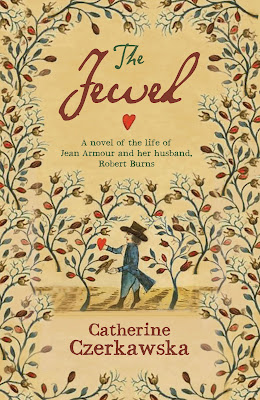 |
| Old Mossgiel |
When he was farming at Mossgiel, where our milk comes from, Burns employed a herd-boy called Willie Patrick. Many years later, in 1859, another William, a Burns enthusiast called William Jolly, went on a pilgrimage to Burns Country, visiting Mauchline and Mossgiel. While he was wandering about Mauchline, he met Willie Patrick and asked him about his memories of the Burns family. This formed the basis for a little book called Robert Burns at Mossgiel, with Reminiscences of the Poet by his Herd-Boy. You can still find reprints online if you hunt for them. Asked to do a brief Immortal Memory speech and toast at a small local Burns Supper, I dug out my copy and reread it, for inspiration.
Willie Patrick had been born in 1776, so was in his 84th year when Mr Jolly met him. He was short, and very bent, after a life of hard labour. Jolly describes him as being in good health, clear in his mind, shrewd and full of humour. He had a staff, which he leant on, although he could walk without it.
He wrote "When making any statement, he would turn quickly round and earnestly answer me that ‘it was as sure as death’ or ‘as sure as I knock the heid aff that thistle.’"
Willie spent four years at Mossgiel, working for Robert and his brother Gilbert, between March 1784 and April 1788. This meant that he started work as a little lad of eight, and worked there till he was twelve - afterwards becoming a shoemaker, before serving in the army and eventually working for the poet’s friend, Gavin Hamilton.
At Mossgiel, he was herd callant, watching over the herd, or occasionally gaudsman, accompanying Burns when he was ploughing, to help drive the four horses. However, in view of his age, he mostly did odd jobs about the farm. Willie remembered that the Burns family lived chiefly in the kitchen, as most farming households did and probably still do. Robert’s father had died at Lochlea, a rather unhappy place for the family. The two elder boys had actually taken on the Mossgiel tenancy before their father died, without telling him, reluctant to add to his worries. Their mother, Agnes – ‘a wee booed body’ as Willie called her - spent a lot of time sitting close beside the fire. Willie said that the house was largely kept by Isabel, known as Bell, the youngest daughter, although that may have been because she was closer in age, and very much his favourite sister. There were two older sisters, Agnes and Annabella, who were probably involved with dairying, and two younger brothers, William and the youngest son, John, who died aged 16, while Willie Patrick was working at the farm.
Gilbert was a year younger than Robert, but Willie observed that he took more charge of the farm, given that Robert was so taken up with his poetry. The family, especially the women, made Dunlop cheese, a sweet milk cheese, from the rich milk of the Ayrshire cows, no doubt learning from their mother, who already had the skill of cheesemaking .
Besides the sisters, there was a female friend who helped in the kitchen, and Rab’s ‘dear bought Bess’, his little daughter by Elizabeth Paton whom he had welcomed into his house. Latterly, this large household was joined by one of Jean Armour’s first set of twins, Robert, then only a toddler. There were no female servants at all – just friends and family. After a few turbulent years, after the marriage was formalised, Jean would walk up to the farm from her rooms in Castle Street, to learn dairying and cheese making from the Burns sisters. When Jean and Rab moved to Ellisland, Burns was supposedly the first to introduce the handsome brown and white Ayrshire cow to the county. All the household slept in the house, while the male servants, including young Willie Patrick, slept in the stable loft.
Willie did little jobs about the kitchen, as well as feeding and herding cattle, mucking the byre, and running into town on various errands, but most of all carrying letters – more of them than was at all common at that time for a farming family. The poet was a great correspondent and was always sending away for books.

Gavin Hamilton's House, Mauchline
The whole household took their meals in the kitchen, and Wille remembered that Rab was ‘aye reading,’ even at mealtimes. Gilbert was a ‘douce and sensible man’ but Willie was more impressed with Rab. He described him as smart, manly and good looking, liked by everyone except a few of the ‘stricter sort’ (including Jean Armour’s father who hated him at that time, although he came round in the end!) – and those who feared his wild reputation. He says he never once saw him the worse for liquor. He over-indulged at times, but was never a drunkard.
Most important of all, he was a ‘good master' good natured and kindly towards all those who worked on the farm, even if he seemed distracted by things that other people never noticed. 'He was aye pickin up things and thinkin ower them for a lang time’ says Willie, adding that he was a special favourite with the lasses ‘He could aye speak up to them’ – a gift, and a charm that never left him throughout his too short life.
Lovely to read the words of somebody who had known the poet and worked with him on a day-to-day basis. Especially since he was remembered so fondly as a good man and a kindly master.

























